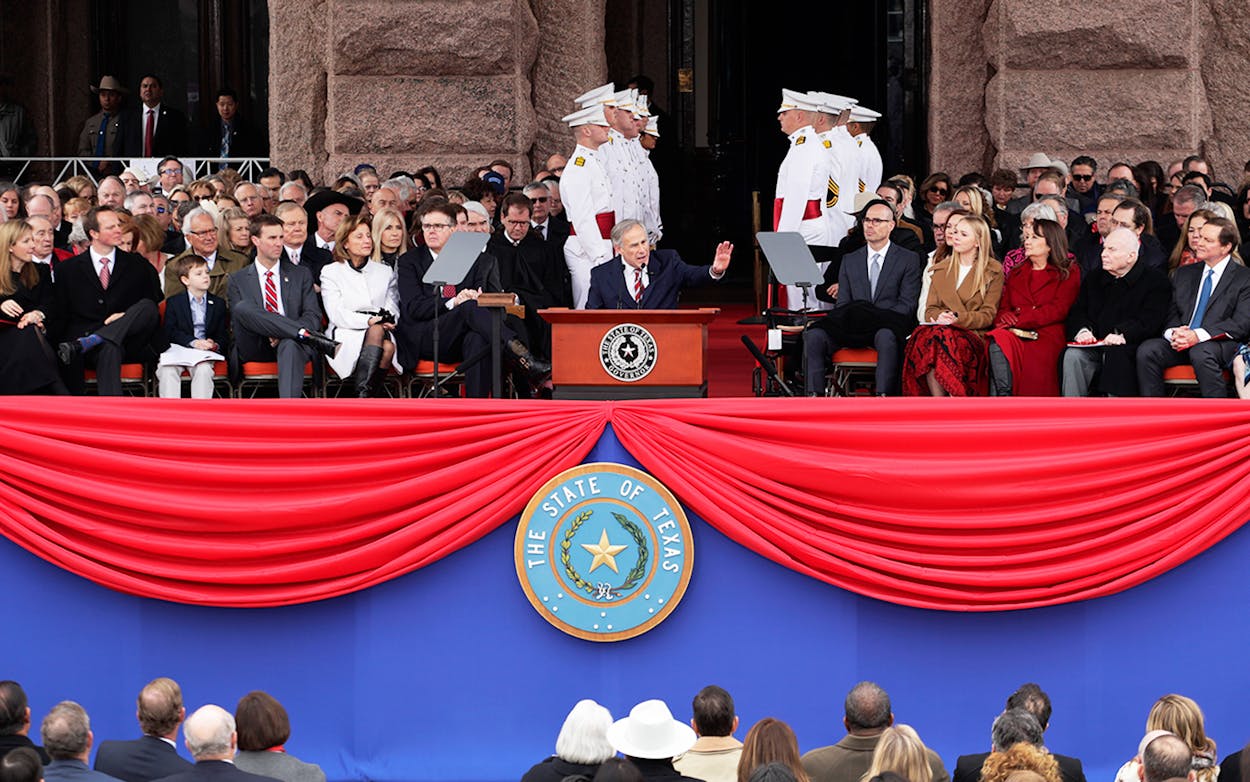In the first inauguration set against the backdrop of the north, rather than the south, side of the Texas Capitol in modern history, Greg Abbott took the oath of office for the second time as the state’s governor on Tuesday. Abbott’s subsequent speech emphasized education and property tax relief, building on an announcement by Lieutenant Governor Dan Patrick (also sworn in for a second term) that legislation had been filed for the first across-the-board teacher pay hike in a generation: $5,000 per teacher, for a total cost of $3.7 billion.
The change of venue for the inauguration happened because officials were concerned that the live oak trees on the south side of the Capitol would obstruct the view for many at the swearing-in ceremony. But one might hope the new venue is a good omen for lawmakers’ desire to make big changes in funding Texas public schools. In the past, school finance reform has typically been ordered by the judiciary, something Abbott said would not be necessary after this legislative session. A solid first step had been Lieutenant Governor Patrick’s announcement that the head of his Senate Finance Committee, Senator Jane Nelson, R-Flower Mound, had filed a bill that would give each of the 350,000 Texas public school teachers a raise. “It’s been twenty years since they’ve had an across-the-board raise,” Patrick said. Critics immediately argued that the measure didn’t go far enough, noting that every public school has a support staff and that as many as 350,000 more public school employees would not be eligible for the pay hike because they are not in the classroom.
Abbott was sworn in by Texas Chief Justice Nathan Hecht; the governor lay his hand on the Sam Houston Bible and his own family Bible. His first words showed his ambition for the 86th Texas Legislature, which began last week. “We gather today for far more than just an inauguration,” Abbott said. “Today is the dawn of a transformative session that will usher in a new era. A new era for children, teachers, and taxpayers.”
After a slew of thank you’s to supporters and family, Abbott struck up a theme that Texas is a state at the top of its game. But he challenged lawmakers gathered behind him to take that game to another level: “Despite the exceptional heights to which Texas has climbed, I believe we have only risen to the foothills of what we can become,” he said. “I know we can do even more for our fellow Texans.”
Much of Abbott’s optimism rests with the fact that the state is flush with cash. Last week, Texas Comptroller Glenn Hegar projected the state will bring in more than $119 billion in revenue over the next biennium, which begins in 2020. In building a state budget, lawmakers cannot exceed that estimate, but its $9 billion increase over the current biennium offers a lot of wiggle room. Indeed, on Monday the House released a spending plan that includes $7 billion more in education funding than the current biennium. If federal and local funds are considered, that would be a total of more than $70 billion for the two-year spending cycle for education—a nearly 17 percent increase over the current biennium’s budget for education. In addition, the proposed budget calls for a withdrawal of $633 million from the state’s Economic Stabilization, or rainy day, fund, to pay for teacher pensions, school safety, and disaster relief programs. The Senate also released a proposed budget on Tuesday that included the money for a pay raise, as well as an additional $2.4 billion for enrollment growth and $2.3 billion to help some school districts from having to give money back to the state under the recapture or Robin Hood system that currently governs school funding.
“It is time for Texas to deliver real education reform,” Abbott said, building on a theme of unity among the Big Three of state government: the governor, the lieutenant governor, and new House Speaker Dennis Bonnen. The last two legislative sessions were marked more by the disunity of that leadership, as former House Speaker Joe Straus was often at conflict with Abbott and Patrick—particularly on socially conservative issues championed by the governor and lieutenant governor that are not a major part of the political landscape so far this year.
Starkly missing from the governor’s inaugural address was any mention of border security, the issue that is bedeviling congressional Democrats and President Trump and that has caused the longest partial federal government shutdown in U.S. history. Patrick, on hand for last week’s visit by Trump to McAllen, promised then that border security levels would remain at $800 million, but only the highlights of the proposed Senate budget were released Tuesday, meaning actual border security funding levels remain unknown.
The inauguration itself was a lower-key event than Abbott’s initial swearing-in four years ago, as typically happens for second-term governors. Abbott and the inaugural committee opted not to have an inaugural parade and instead kept the events on the grounds of the Capitol. It began at a morning prayer service at Austin’s First Baptist Church. The inauguration itself began with the Pledge of Allegiance, led by Longview Boy Scout Troop 201, of which Abbott was a member when he was a child. Following the swearing-in, an estimated 10,000 onlookers feasted on Texas barbecue cooked by Terrell pitmaster Eddie Deen, who was catering his seventh Texas inauguration. A sold-out inaugural ball Tuesday evening featured George Strait.
- More About:
- Politics & Policy
- Greg Abbott
- Dan Patrick
- Austin






